Bangladesh unveils first large-scale water reuse facility in RMG sector

Published :
Updated :

Bangladesh has launched its first large-scale Water Reuse and Improved Wastewater Management Demonstration plant at Fakir Knitwears Ltd. in Narayanganj. The initiative marks a significant step toward reducing freshwater extraction and industrial pollution in the country’s crucial readymade garment (RMG) sector.
The project—co-hosted by Primark, Fakir Knitwears Ltd., and the World Bank’s 2030 Water Resources Group—aims to reduce groundwater use by 30 per cent, supporting both Bangladesh’s Sustainability Water Roadmap 2030 and the UN Sustainable Development Goal 6 (Clean Water and Sanitation).
The state-of-the-art facility will enable the reuse of 438,000 cubic meters of water annually, leading to a 22 per cent reduction in total production water consumption. It has been tested for commercial and technical viability by a global consortium including Primark, H&M Group, and Panta Rei, with support from the UK Government’s SMEP Programme and UNCTAD.
“This facility comes at a time when over 90% of water bodies near industrial areas in Bangladesh are classified as severely polluted,” said Lewys Isaac, representative of Primark, addressing the project launching ceremony at Fakir Knitwears Ltd. “This model provides a pathway to move away from such pollution and towards circular water use.”
Ziaur Rahman, Regional Country Manager of H&M, added, “To build a sustainable environment, we must all work together in unison. Collaboration is key.”
Managing Director of Fakir Group, Fakir Akhtaruzzaman, said, “This initiative reflects our commitment to responsible industrial growth. It will protect water resources for future generations and set a benchmark for others to follow.”
The inaugural ceremony was attended by Robiul Alam, Joint Secretary of the Ministry of Water Resources, as the chief guest. Fakir Mashfiquzzaman Fabi, Director of Fakir Knitwears Ltd., presided over the event. Special guests included Lutful Ahmed, Additional Director General of the Department of Environment, and Dr. Mohammad Lutfur Rahman, Director of the Water Resources Planning Organization (WARPO).
Representatives from BGMEA, BKMEA, the French Development Bank (AFD), KfW Development Bank, and various international development partners were present, signalling strong institutional and industry-wide support.
The project is also the first major demonstration under the National Alliance for Water Reuse and Recycling, formed in May 2025 by the Government of Bangladesh, the World Bank, and WARPO. The alliance aims to scale sustainable water use practices across the country’s export-oriented industries.
The demonstration facility aligns with several national policies and strategies, including the Bangladesh Water Act 2013, the National Water Policy 1999, and the Bangladesh Delta Plan 2100. It is expected to influence broader adoption of water reuse technologies across the industrial sector.
Besides improving environmental outcomes, the project is anticipated to generate green employment opportunities for engineers, technicians, and factory staff through the deployment of advanced water treatment systems.
Industry experts view this development as a replicable and scalable model that strengthens Bangladesh’s position as a leader in sustainable and responsible manufacturing in the global apparel value chain.


 For all latest news, follow The Financial Express Google News channel.
For all latest news, follow The Financial Express Google News channel.